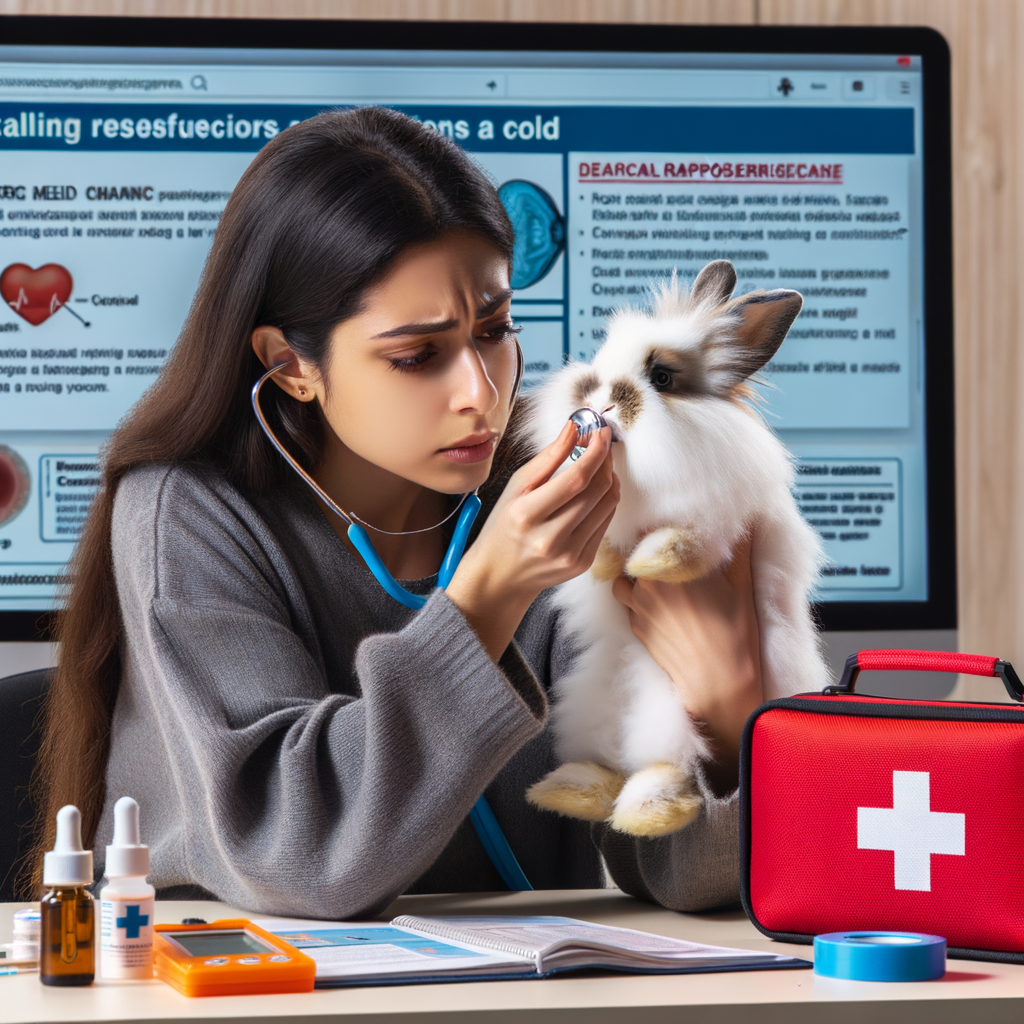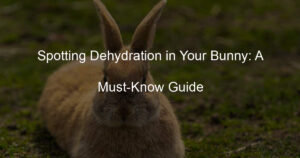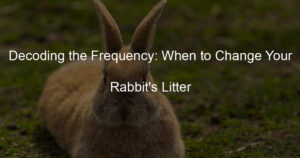
Introduction to Lionhead Rabbit Health
When it comes to our furry friends, their health is of utmost importance. This is particularly true for Lionhead Rabbits, a unique breed known for their distinctive mane of hair. In this article, we will delve into the critical aspects of Lionhead Rabbit health, helping you understand how to keep your pet in the best possible shape.
- Understanding the Importance of Your Lionhead Rabbit’s Health
Just like humans, rabbits need proper care to stay healthy. They require a balanced diet, regular exercise, and frequent check-ups. As a Lionhead Rabbit owner, it’s crucial to understand that your pet’s health can directly influence their lifespan, happiness, and overall quality of life. A healthy rabbit is a happy rabbit, and a happy rabbit can bring immense joy to your home.
- Common Health Issues in Lionhead Rabbits
While Lionhead Rabbits are generally robust, they can be prone to certain health issues. Some of the most common problems include dental disease, respiratory issues, and gastrointestinal stasis. These conditions can be severe if not addressed promptly, which is why it’s essential to keep an eye on your rabbit’s health and consult a vet if you notice any changes in behavior or physical condition.
For instance, dental disease in rabbits can lead to weight loss, drooling, and a lack of appetite. Respiratory issues, on the other hand, can cause sneezing, nasal discharge, and difficulty breathing. Gastrointestinal stasis, a condition where the rabbit’s digestive system slows down, can lead to a lack of appetite and reduced fecal output.
By understanding these common health issues, you can take proactive steps to prevent them and ensure your Lionhead Rabbit lives a long, healthy life. In the following sections, we will delve deeper into these issues, providing you with the knowledge you need to keep your rabbit healthy.
Understanding Rabbit Respiratory Problems
Respiratory issues in rabbits, particularly Lionhead rabbits, can be a cause for concern. It’s important to understand the symptoms and signs of these problems to ensure your rabbit’s health and well-being.
Common Symptoms of Rabbit Respiratory Issues
There are several symptoms that can indicate a rabbit is experiencing respiratory issues. These symptoms can range from mild to severe, and it’s important to monitor your rabbit closely if you notice any changes in their behavior or physical condition.
- Identifying Rabbit Sneezing Symptoms
- Other signs of respiratory problems in rabbits
Sneezing is one of the most common symptoms of respiratory issues in rabbits. If your rabbit is sneezing frequently, it could be a sign of a respiratory problem. Other symptoms to look out for include a runny nose and watery eyes. Remember, occasional sneezing is normal, but frequent or persistent sneezing is a cause for concern.
Aside from sneezing, there are other signs that your rabbit may be experiencing respiratory issues. These include difficulty breathing, loss of appetite, lethargy, and a change in the sound of their breathing. If you notice any of these symptoms, it’s important to seek veterinary care immediately.
Understanding the symptoms of respiratory problems in rabbits is the first step towards ensuring their health. If you notice any of these symptoms, don’t hesitate to consult with a veterinarian. Early detection and treatment can make a significant difference in your rabbit’s health and quality of life.
Causes of Rabbit Respiratory Problems
Understanding the causes of respiratory problems in rabbits is essential to ensure their health and wellbeing. There are two primary factors that can contribute to these issues:
- Environmental Factors
- Underlying Health Conditions
The environment in which a rabbit lives plays a significant role in its respiratory health. Factors such as poor ventilation, high humidity, and exposure to dust or allergens can lead to respiratory problems. For instance, a rabbit living in a cage with poor ventilation may be exposed to high levels of ammonia from urine, which can irritate the respiratory system and cause problems. Similarly, exposure to dust from bedding or hay can also lead to respiratory issues. It’s crucial to maintain a clean, well-ventilated environment for your rabbit to prevent these problems.
Rabbits may also suffer from respiratory problems due to underlying health conditions. These can include dental diseases, bacterial infections, or even heart diseases. For example, dental diseases can cause a rabbit’s teeth to grow into its nasal passages, leading to breathing difficulties. Bacterial infections, on the other hand, can cause pneumonia, a serious condition that affects the lungs. Heart diseases can also lead to fluid build-up in the lungs, causing respiratory problems. Regular check-ups with a vet can help detect these conditions early and prevent serious respiratory issues.
In conclusion, understanding the causes of respiratory problems in rabbits, whether they are environmental or due to underlying health conditions, is crucial to ensure their health and wellbeing. By maintaining a clean, well-ventilated environment and regular vet check-ups, you can help prevent these issues and ensure your rabbit leads a healthy, happy life.
Lionhead Rabbit Sneezing: What Does it Mean?
If you’ve noticed your Lionhead rabbit sneezing, you might be wondering what’s going on. Is it just a cute quirk, or could it be a sign of something more serious? Let’s dive into this topic and find out.
- Why is my Lionhead Rabbit sneezing?
- When to be concerned about your rabbit’s sneezing
Just like humans, rabbits can sneeze for a variety of reasons. It could be something as simple as dust or hay irritating their nose. However, if your rabbit is sneezing frequently, it could be a sign of a respiratory problem. In some cases, sneezing can be a symptom of a condition called Pasteurella, which is a bacterial infection that can affect a rabbit’s respiratory system.
It’s normal for rabbits to sneeze occasionally. But if your rabbit is sneezing a lot, or if they have other symptoms like a runny nose, watery eyes, or they’re not eating as much as usual, it’s time to consult a vet. These could be signs of a serious health issue that needs immediate attention.
Remember, it’s always better to be safe than sorry when it comes to your pet’s health. If you’re ever in doubt, don’t hesitate to reach out to a professional.
Key Takeaways
| Reasons for Sneezing | When to be Concerned |
|---|---|
| Dust or hay irritation, occasional sneezes | Normal, no immediate concern |
| Frequent sneezing, symptoms of respiratory problems | Consult a vet immediately |
Keeping an eye on your rabbit’s behavior and health is crucial. If you notice any changes, it’s always best to seek professional advice. Your furry friend is counting on you to keep them healthy and happy!
Addressing Rabbit Respiratory Issues
When it comes to the health of your Lionhead rabbit, understanding and addressing respiratory issues is crucial. One common sign of a respiratory problem is sneezing. But what should you do when your rabbit sneezes? Let’s explore.
What to Do When Your Rabbit Sneezes
Sneezing in rabbits can be a sign of a minor issue or a symptom of a more serious respiratory problem. Here are two important steps to take when your rabbit starts sneezing:
- Monitoring your rabbit’s behavior
- When to seek veterinary care
Keep a close eye on your rabbit’s behavior. Note any changes in eating, drinking, or activity levels. If your rabbit is sneezing but otherwise appears healthy, it may not be a cause for concern. However, if your rabbit is sneezing and also showing signs of distress such as lethargy, loss of appetite, or difficulty breathing, it could indicate a more serious issue.
If your rabbit’s sneezing is accompanied by other symptoms or if the sneezing is persistent, it’s time to seek professional help. A vet can perform tests to determine the cause of the sneezing and recommend appropriate treatment. Remember, it’s always better to be safe than sorry when it comes to your rabbit’s health.
In conclusion, sneezing in rabbits can be a sign of a minor issue or a symptom of a more serious respiratory problem. Monitoring your rabbit’s behavior and seeking veterinary care when necessary are key steps in addressing this issue.
Stay tuned for our next section where we will discuss common treatments for rabbit respiratory problems and the pros and cons of home remedies versus professional care.
Treating Sneezing in Rabbits
When it comes to our furry friends, their health is of utmost importance. One common issue that rabbits face is respiratory problems, which often manifest as sneezing. Let’s delve into the common treatments for these issues and discuss the pros and cons of home remedies versus professional care.
- Common treatments for rabbit respiratory problems
- Home remedies vs. professional care
Rabbits, like humans, can suffer from a variety of respiratory issues. These can range from simple allergies to more serious conditions like pneumonia. The most common treatment for these problems is antibiotics, which can help fight off the bacteria causing the issue. Other treatments may include nebulization, which involves the use of a machine to deliver medication directly into the rabbit’s lungs. It’s crucial to remember that any treatment should be administered under the guidance of a professional vet.
While home remedies can be helpful in some cases, they should never replace professional care. Home remedies such as ensuring your rabbit has a clean and dust-free environment, providing fresh water and food, and keeping them warm can help alleviate symptoms. However, these measures are often not enough to fully treat the problem. Professional care is essential as vets have the knowledge and tools to accurately diagnose and treat your rabbit’s condition. Remember, early detection and treatment can save your rabbit’s life.
In conclusion, treating sneezing in rabbits involves a combination of professional care and home remedies. It’s important to monitor your rabbit’s health closely and seek professional help when needed. Your rabbit’s health and happiness are worth it!
Lionhead Rabbit Care: Preventing Respiratory Issues
When it comes to the health of your Lionhead Rabbit, prevention is always better than cure. One of the most common health issues in these adorable pets is respiratory problems. But don’t worry, with the right care and attention, you can help your furry friend avoid these issues. Let’s explore how.
- Creating a healthy environment for your Lionhead Rabbit
First and foremost, the environment in which your Lionhead Rabbit lives plays a crucial role in its overall health. A clean, well-ventilated space is essential to prevent respiratory issues. Here’s how you can create a healthy environment:
- Keep their living area clean: Regularly clean your rabbit’s hutch to prevent the build-up of bacteria that can cause respiratory problems.
- Provide fresh air: Ensure your rabbit’s living space is well-ventilated. Stale, stuffy air can lead to respiratory issues.
- Control temperature: Extreme temperatures can stress your rabbit and weaken its immune system, making it more susceptible to illnesses. Keep your rabbit in a comfortable, stable temperature.
- Regular check-ups and preventative care
Regular veterinary check-ups are a vital part of your Lionhead Rabbit’s preventative care routine. These check-ups can help detect potential issues early and provide treatment before they become serious. Here’s what you should know:
- Annual check-ups: Schedule a veterinary visit at least once a year. Your vet can check for signs of respiratory problems and other health issues.
- Vaccinations: Ensure your rabbit is up-to-date with all necessary vaccinations. Vaccines can help protect your rabbit from various diseases, including those that can cause respiratory problems.
- Regular grooming: Regular grooming can prevent hairballs and dust, which can lead to respiratory issues. Brush your rabbit’s fur regularly and keep their nails trimmed.
Remember, a healthy Lionhead Rabbit is a happy one. By creating a healthy environment and ensuring regular check-ups and preventative care, you can help your furry friend live a long, healthy life free from respiratory issues.
Case Study: Treating a Sneezing Lionhead Rabbit
Let’s delve into a real-life example to better understand how to handle a sneezing Lionhead rabbit. This case study involves a Lionhead rabbit named Fluffy who had a persistent sneezing problem.
- Background of the case:
- Steps taken to address the sneezing:
- Outcome and key takeaways:
Fluffy, a two-year-old Lionhead rabbit, started sneezing frequently. His owner, Mrs. Smith, noticed that Fluffy’s sneezing was not just a one-time occurrence and was accompanied by a runny nose. Concerned about Fluffy’s health, Mrs. Smith decided to seek professional help.
Fluffy was taken to a vet who specializes in rabbit health. The vet conducted a thorough examination and determined that Fluffy’s sneezing was due to a respiratory infection. The vet prescribed a course of antibiotics and recommended that Fluffy’s living area be kept clean and dust-free to prevent further irritation to his respiratory system.
After two weeks of treatment, Fluffy’s sneezing significantly reduced. Mrs. Smith made sure to keep Fluffy’s living area clean and dust-free. She also learned to recognize early signs of respiratory issues in rabbits, such as sneezing and a runny nose.
In conclusion, it’s crucial to pay attention to your Lionhead rabbit’s health and behavior. Regular vet check-ups and maintaining a clean living environment can go a long way in preventing respiratory issues. Remember, early detection and treatment can make a significant difference in your rabbit’s health.
Conclusion: Ensuring Your Lionhead Rabbit’s Health
As we reach the end of our discussion on Lionhead Rabbit health, it’s important to recap and emphasize the key points. We’ve learned about the common respiratory issues that these adorable creatures can face, and the importance of proactive care in maintaining their health.
- Recap of Lionhead Rabbit respiratory issues
Lionhead Rabbits, like other breeds, can suffer from various respiratory issues. Sneezing is a common symptom that can indicate a range of problems, from a simple dust allergy to a serious bacterial infection. It’s important to monitor your rabbit’s behavior and seek veterinary care if you notice excessive or persistent sneezing.
Other respiratory issues can include nasal discharge, difficulty breathing, and a change in vocal sounds. These symptoms can be signs of serious health problems and should not be ignored. Remember, early detection and treatment can make a significant difference in your rabbit’s health and quality of life.
- Importance of proactive care
Proactive care is the key to ensuring your Lionhead Rabbit’s health. Regular check-ups with a vet, a balanced diet, and a clean living environment can help prevent respiratory and other health issues. It’s also important to handle your rabbit gently and provide them with plenty of exercise and social interaction.
Remember, a healthy rabbit is a happy rabbit. By understanding the potential health issues and taking proactive steps to prevent them, you can ensure that your Lionhead Rabbit lives a long, healthy, and happy life.
As a final note, always remember that each rabbit is unique. What works for one might not work for another. Therefore, it’s essential to know your rabbit well and provide care that suits their individual needs and personality.
Thank you for joining us in this discussion about Lionhead Rabbit health. We hope you’ve found the information helpful and that it will assist you in providing the best possible care for your furry friend.




